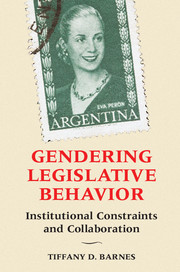Book contents
- Frontmatter
- Dedication
- Contents
- List of Tables
- List of Figures
- Acknowledgments
- 1 Introduction
- 2 A Theory of Legislative Collaboration
- 3 Can Democracy Be Collaborative? Examining Patterns of Collaboration
- 4 Why Do Women Collaborate? Evidence of Women's Marginalization
- 5 When Do Women Collaborate? Explaining Between-Chamber Variation
- 6 When Do Women Collaborate? Explaining Within-Chamber Variation
- 7 Collaboration in a Cross-National Context
- 8 Conclusion
- References
- Index
7 - Collaboration in a Cross-National Context
Published online by Cambridge University Press: 05 June 2016
- Frontmatter
- Dedication
- Contents
- List of Tables
- List of Figures
- Acknowledgments
- 1 Introduction
- 2 A Theory of Legislative Collaboration
- 3 Can Democracy Be Collaborative? Examining Patterns of Collaboration
- 4 Why Do Women Collaborate? Evidence of Women's Marginalization
- 5 When Do Women Collaborate? Explaining Between-Chamber Variation
- 6 When Do Women Collaborate? Explaining Within-Chamber Variation
- 7 Collaboration in a Cross-National Context
- 8 Conclusion
- References
- Index
Summary
Evidence from Argentina shows that women entering male-dominated legislatures face structural barriers and have limited ability to exert influence on the policy-making process. As a result, women have strong incentives to collaborate in order to overcome such barriers, exert influence in the chamber, and gain a voice in the policy-making process. Despite the many benefits of collaboration, its prevalence varies between legislative contexts because not all women have the same opportunities to collaborate. In Argentina, women facing weak party constraints are more likely to collaborate than their male colleagues, and their propensity to do so increases as women's numeric representation increases. By contrast, women facing strong party constraints have limited opportunities to collaborate with other women. Instead, these women behave more like their male colleagues and collaborate less frequently. The effects of strong party constraints are mitigated by other factors; notably affiliation with the executive's party, seniority, and women's issues legislation motivate collaboration among women.
In this chapter, I draw on a series of case studies from across the world in order to expand my analysis and to demonstrate the generalizability of my theory beyond Argentina. I evaluate data from four national parliaments: the Rwandan Chamber of Deputies, the U.S. Senate, the Uruguayan Congress, and the South African Parliament. In doing so, I examine countries that have different legislative contexts than the ones found in Argentina, thus providing broader tests of how other legislative contexts constrain or facilitate women's collaboration.
I present this set of case studies to facilitate the exploration of how institutional arrangements structure women's collaboration outside of the Argentine provinces. As I explain in Chapter 2, electoral institutions that concentrate power in the hands of party leaders and foster strong party loyalty constrain women's collaboration. By contrast, electoral institutions that allow legislators to act independently of political parties impose fewer constraints on women's collaboration. Whereas the Argentine provinces enabled me to test these expectations for both women facing strong party constraints and women facing comparably weaker party constraints (i.e., closed-list PR systems with large district magnitudes and closed-list PR systems with small district magnitudes), these four additional cases allow me to examine collaboration in legislatures across the full range of party constraints.
- Type
- Chapter
- Information
- Gendering Legislative BehaviorInstitutional Constraints and Collaboration, pp. 177 - 211Publisher: Cambridge University PressPrint publication year: 2016



